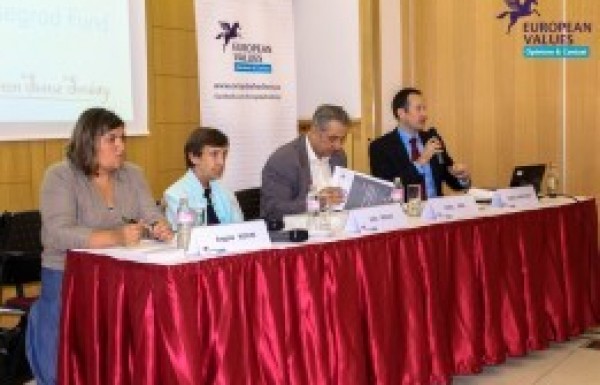
On 23rd July 2014 in Budapest, Policy Solutions and the European Values Think Tank (EV TT), a Prague-based public policy research institute, organized a National Seminar on political communication of integration of minorities, consisting of a roundtable discussion and public debate.
The Budapest seminar was a part of the international project, coordinated by the EV TT, “Defining Responses to Rise of Extremism in Europe,” which responds to the rise of populism and political extremism in Europe directed against minorities. It addresses reactions of mainstream parties to the radical rhetoric of populist and far-right extremist parties. The project takes place in the countries belonging to the Visegrad Group, and Austria.
At the roundtable debate the project’s key findings, general recommendations on how should politicians communicate integration of minorities were discussed. Among the participating experts at the roundtable were Attila Ágh from Corvinus University, Endre Sík from ELTE University and TÁRKI, Attila Bartha from Centre for Social Sciences, Hungarian Academy of Sciences and Center for Policy Studies at CEU, Julia Szalai from Department of Political Science at CEU, Balázs Dobos from Hungarian Academy of Sciences, Centre for Social Sciences, Andrea Pető from Department of Gender Studies at CEU, Dániel Róna from Corvinus University and Sara Svensson from Department of Public Policy at CEU.
The invitation to speak also at the panel of the public debate, “How Should Politicians Communicate Integration of Minorities,“ accepted Julia Szalai and Attila Ágh The third distinguished guest introducing her perspective on the given topic was Angela Kocze from Hungarian Academy of Sciences, Wake Forest University NC.
During the debate the results of an international research project were presented. The study shows that one of the reasons of growing popularity of protest populist parties in Europe is the fact that the mainstream parties fail to communicate the problematic of integration of minorities and immigrants.
Policy Solutions is a progressive political research institute based in Budapest. It was founded in 2008 and it is committed to the values of liberal democracy, solidarity, equal opportunity, sustainability and European integration. The focus of Policy Solutions’ work is on understanding political processes in Hungary and the European Union. Among the pre-eminent areas of our research are the investigation of how the quality of democracy evolves, the analysis of factors driving euroscepticism, populism and the far-right, and election research.
Follow us on Facebook!